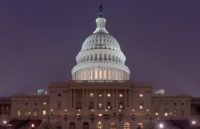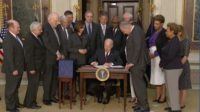The Senate and House have passed, and President Joe Biden has signed, yet another short-term spending measure, avoiding a widespread shutdown in federal programs. It is the third such extension since Oct. 1.
Final congressional approval came on Jan. 18, when the House cleared the measure by a 314-108 vote. That followed the Senate's passage earlier in the day, on a 77-18 vote. Biden signed the bill on Jan. 19.
The previous short-term continuing resolution, or CR, was due to lapse on Jan. 19 or Feb. 2, depending on the department or agency. House Speaker Mike Johnson (R-La.) devised the unusual dual-track approach.
Two Deadlines
The Jan. 19 deadline applied to programs funded by eight of the 12 individual appropriations bills including those that cover most major federal federal construction budget accounts, those at the Dept. of Transportation, most of those at the Dept. of Energy as well as military construction and the U.S. Army Corps of Engineers civil works program.
Under the new CR, those programs will see their funding extended through March 1.
The other four appropriations bills include some federal construction programs, too, including those overseen by the Environmental Protection Agency as well as General Services Administration federal buildings and State Dept. embassy construction accounts. Under the new CR, their funding carries through March 8.
Lawmakers now face the difficult task of having House and Senate appropriations committees negotiate and agree to funding levels for the scores of individual line items that make up the annual spending bills.
Infrastructure advocates were rooting for getting the new extension signed into law and keeping federal programs operating.
But CRs do have some shortcomings. The Associated General Contractors of America said that under such short-term measures, federal agencies cannot initiate new project starts during a CR period, thus delaying projects from moving forward.
What opened the door to the latest stopgap was a Jan. 7 announcement from Schumer and Johnson that they had reached agreement on overall federal spending totals—the “top line."
The Committee for a Responsible Federal Budget, a nonpartisan organization, estimates the total at $1.7 trillion.
Story updated on 1/22/2024 to include Biden's signing of the legislation.






Post a comment to this article
Report Abusive Comment